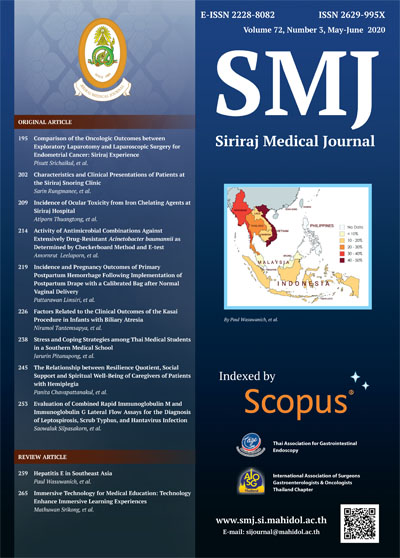The Relationship between Resilience Quotient, Social Support and Spiritual Well-Being of Caregivers of Patients with Hemiplegia
DOI:
https://doi.org/10.33192/Smj.2020.33Keywords:
Resilience quotient, social support, spiritual well-being, caregiver of patients with hemiplegiaAbstract
Objective: There are three main objectives of this study. The first is to study the levels of resilience quotient, social support and spiritual well-being of caregivers of patients with hemiplegia. The second is to study the relationship between resilience quotient and spiritual well-being of caregivers to patients with hemiplegia. The third objective is to study the relationship between social support and spiritual well-being of caregivers of patients with hemiplegia.
Methods: The sample of this study is composed of 170 caregivers of patients with hemiplegia who received treatment at the Department of Rehabilitation Medicine, Faculty of Medicine Siriraj Hospital. Data for this study were collected using a psychological questionnaire, and then by adopting analytical statistics, which are percentage, mean, standard deviation and Pearson’s Product Moment Correlation Coefficient.
Results: After data collection and analysis, caregivers of patients with hemiplegia were found to have relatively high levels of resilience quotient and social support. Moreover, they have a high level of spiritual well-being. Taken together, these results suggest that there is a positive correlation between resilience quotient and the spiritual well-being of caregivers of patients with hemiplegia, with statistical significance at the .01 level. There is also a positive correlation between social support and the spiritual well-being of caregivers of patients with hemiplegia, with a statistical significance at the .01 level.
Conclusion: This research results can be used as a guideline for efforts to enhance the resilient quotient, social support and spiritual well-being of caregivers by providing knowledge, information and caregiving equipment to them. Moreover, caregivers should be encouraged to enjoy their free time by engaging in creative activities and religious activities, which are believed to help increase mental peace.
References
2. Department of Empowerment of Persons with Disabilities. Statistic report on persons with disabilities in Thailand. Department of Empowerment of Persons with Disabilities; 2017.p.4.
3. Department of Empowerment of Persons with Disabilities. Statistic report on persons with disabilities in Thailand. Department of Empowerment of Persons with Disabilities; 2018.p.3.
4. Charnnarong N. Stroke is the number cause of death of Thai people. In: Hfocus Delve into health system. Available from: https://www.hfocus.org/content/2019/04/17033
5. Department of Mental Health. From bad to good RQ Resilience Quotient. Nonthaburi: Social Mental Health Office, Department of Mental Health, Ministry of Public Health; 2009.
6. House J. Work Stress and Social Support Reading. Mass: Addison Wesley; 1981.
7. Schaefer C, Coyne J, Lazarus R. The Health-Related Functions of Social Support. J Behav Med 1981;4:381-406.
8. Charoenjittikul C. Spirit: Caregiving. Journal of Huachiew Chalermprakiet University 2004;7:78-87.
9. Highfield F, Cason C. Spiritual need of patient: are they recognized? Cancer Nurs 1983;6:187-92.
10. Hungelmann J, Kenkel-Rossi E, Klassen L, Stollenwerk R. Focus on spiritual well-being: harmonious interconnectedness of mind-body-spirit-use of the JAREL spiritual well-being scale. Geriatr Nurs 1996;17:262-6.
11. Yamane T. Statistics: An Introductory Analysis. 3rd ed. New York: Harper & Row; 1973.p.725-33.
12. Watthong A, Techameena S. The effect of the E&R Program on mental health of caregivers of children with developmental and intellectual disabilities Rajanukun Development Center (Muangkae) Rajanukun Institute. Rajanukun Institute, Ministry of Public Health; 2011.p.29.
13. Wattayakorn P, Chongchareon W, Chukumnerd P. Spiritual Well-Being and Spirituality at Work of Head Nurses in General Hospitals, Southern Thailand. Academic Journal of Prince of Songkla University; 2016;27:115-26.
14. Sukheeluk P, Nuanchana K, Rabudda L. The result of developing caregiver potential for stroke patients at home in Maharaj district, Phranakhon Si Ayuthhaya province Available from: https://www.ayo.moph.go.th/main/index.php?mod=MultiForms&id=2aa0221e1b882110ef5554b 77f26c4f
15. Panphadung S, Nilmanut K, Kitrungrote L. Impact of a Buddhism-Based Spiritual Wellbeing Promotion Programme on the Spiritual Wellbeing of Family Caretakers Responsible for Hospitalised Advanced Gynaecological Cancer Patients. Thai J Nurs 2015;30:16-28.
Downloads
Published
How to Cite
Issue
Section
License
Authors who publish with this journal agree to the following conditions:
Copyright Transfer
In submitting a manuscript, the authors acknowledge that the work will become the copyrighted property of Siriraj Medical Journal upon publication.
License
Articles are licensed under a Creative Commons Attribution-NonCommercial-NoDerivatives 4.0 International License (CC BY-NC-ND 4.0). This license allows for the sharing of the work for non-commercial purposes with proper attribution to the authors and the journal. However, it does not permit modifications or the creation of derivative works.
Sharing and Access
Authors are encouraged to share their article on their personal or institutional websites and through other non-commercial platforms. Doing so can increase readership and citations.















